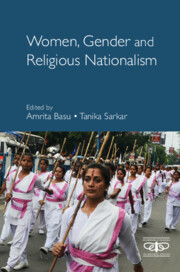Book contents
- Frontmatter
- Dedication
- Contents
- List of Abbreviations
- Introduction: Women of Hindu Rashtra
- Part I Changing Modalities of Hindu Nationalist Organizing
- Part II Gendered Techniques of Mobilization: The Sangh and the Samiti
- Part III Cultivating Women’s Militancy: The Vishva Hindu Parishad
- Part IV Refashioning Gender and Sexuality
- Part V Alternative Activist Responses to the Hindu Right
- Glossary
- About the Contributors
- Index
Introduction: Women of Hindu Rashtra
Published online by Cambridge University Press: 12 August 2022
- Frontmatter
- Dedication
- Contents
- List of Abbreviations
- Introduction: Women of Hindu Rashtra
- Part I Changing Modalities of Hindu Nationalist Organizing
- Part II Gendered Techniques of Mobilization: The Sangh and the Samiti
- Part III Cultivating Women’s Militancy: The Vishva Hindu Parishad
- Part IV Refashioning Gender and Sexuality
- Part V Alternative Activist Responses to the Hindu Right
- Glossary
- About the Contributors
- Index
Summary
I
The present collection of chapters explores an Indian political formation of critical importance from the vantage point of its gender ideology and practices, as well as with respect to the role of its women votaries in militant movements and organizations. Far too often, commentators either overlook these aspects of Hindutva politics or simply brand them as patriarchal and conservative. We, however, believe that we have to go much further than that in order to seize upon the distinctive elements of Hindutva's gender. Our larger purpose is to deepen and broaden our understanding of Hindutva as a political and cultural force of immense significance by employing a gendered prism. I will, therefore, try to explain some of the crucial aspects of Hindutva history in order to provide a general perspective to the chapters.
When we first planned the present volume in 2018, we were yet to grasp the full extent of Hindutva's intentions and power. The results of the 2019 national election have disabused us of several false hopes. It is now abundantly clear that no political or electoral alternative exists at this moment which can obstruct, or even challenge, the Bharatiya Janata Party's (BJP’s) triumphal progress at the national level. The party has won two successive elections, considerably enlarging its vote and seat shares in 2019. Since then, relentless state repression has assumed massive proportions. Strangely, the world has not paid adequate attention to how rapidly its largest democracy is shifting its goalposts.
The tradition of Hindu majoritarianism, which is embedded in Islamophobia, goes back to the late nineteenth century. This includes Hindu historical romances about supposedly fanatical Muslim conquerors, about heroic resistance by Hindu kings. The stories nested a strong gender ideology, too, with their highly coloured legends of mass self-immolations by Hindu queens to escape capture and dishonour at the hands of Muslim invaders. A tenacious popular imaginary sprang from this: the Muslim invades not just a kingdom but the royal Hindu female body as well. The images still resonate today, stronger than ever.
From the early twentieth century, Hindu extremists systematically expanded the stereotype to cover Indian Muslims in general. All – they said – are quintessentially invaders, no matter how many centuries the community has spent in the country.
- Type
- Chapter
- Information
- Women, Gender and Religious Nationalism , pp. 1 - 24Publisher: Cambridge University PressPrint publication year: 2022



